
Joseph “Rev. Run” Simmons left his house — Run’s house, that is — Thursday evening to come to Binghamton University, wearing his clerical collar and withholding little.
Upon his entrance to the Mandela Room, Simmons was met with cheers from an ecstatic audience as he took his place in an armchair onstage. To Simmons’s right was Black Student Union Vice President Jamila Adams, who asked questions ranging from today’s hip-hop, to his home life, to the “birth of the Reverend.”
“Preacher on a Sunday, rapper on a Monday, y’all do what Run say … just because Rev. Run rock a collar, don’t mean I can’t make a dolla, y’all holla,” Simmons rapped to begin the evening.
BSU brought Simmons, one of the founding members of hip-hop group Run-D.M.C. and a practicing minister, to BU as their keynote speaker to round out Black History Month.
Simmons offered a glimpse into his home life during the 2005 MTV reality series “Run’s House.” According to Simmons, the show displayed to viewers the truth of his transformation into a minister, allowing viewers to “see my walk, instead of hearing my talk.”
Simmons said his beginnings as a minister stemmed from his entrance into fame, as the lifestyle in which he indulged came to overwhelm him.
“We were creating rap music … As we was doing it, we was smoking weed, and drinking 40’s, and doing all the stuff that the hood does,” Simmons said. “As things got bigger and better for me, I wanted more of the good life.”
Upon realizing his lavish living in excess, Simmons said, he was brought to tears.
“The reason why I started to cry was because my top had become my bottom,” Simmons said. “It was too much … I didn’t have things; things had me.”
Simmons said his interview with Rolling Stone marked the moment the “Reverend was being born.”
“I’m still swag, but for me, swag now means ‘Saved With Amazing Grace,’ so I’m saved,” Simmons said.
Adams asked Simmons for his opinion on a controversial word used with growing frequency in hip-hop music.
“My view on the word nigga, and don’t take this wrong … When we say it, it’s a term of endearment,” Simmons said. “We own that word, we can do what we want with that word … when we use it, it doesn’t have a negative vibe on it … that’s my view. It’s my opinion, my nigga.”
Adams also asked Simmons about the role music has in uplifting the black race.
“When done right, and then looked at in a correct perspective, rap music and black America has a lot to do with seeing how we move forward,” Simmons said. “And I believe that at the end of the day, hip-hop even put Barack Obama in the White House.”
With young rappers emerging quickly by way of today’s social media outlets, Simmons stressed that their passion should not be stifled or ignored. Society should not be down on today’s rap music, Simmons said, as new artists need their chance to grow.
“I don’t sit in a judgment seat when I see a young rapper,” Simmons said. “You have to give a ‘Run’ a chance to become a ‘Reverend Run.’”
“Yes I’ve transformed, yes I know the Bible inside and out, yes I’m fully saved, yes I love God, no I do not like the degrading of women, no I do not like the way certain things are happening … but I do have mercy in my heart knowing that [young rappers] have a chance to become a ‘Reverend Run,’” Simmons said.
Questions were opened up to audience members, who quickly filed behind a microphone in the center of the aisle. One student requested Simmons’s advice for young college students.
“The same advice that I give to everyone, and that is to find what you love,” Simmons said. “When you find what you love, everything else falls into place. Don’t just do a thing because it’s popular.”
Adams admitted to feeling nervous while onstage with Simmons.
“At the end of the day, though, he made it fun,” Adams said. “I was nervous, but he was laid back and I think that’s what made it work.”
Dena Wilson, a junior majoring in accounting, described the event as one of her most memorable at Binghamton.
“I felt like he was speaking to everyone, truly engaging students with his anecdote and wit,” Wilson said.


